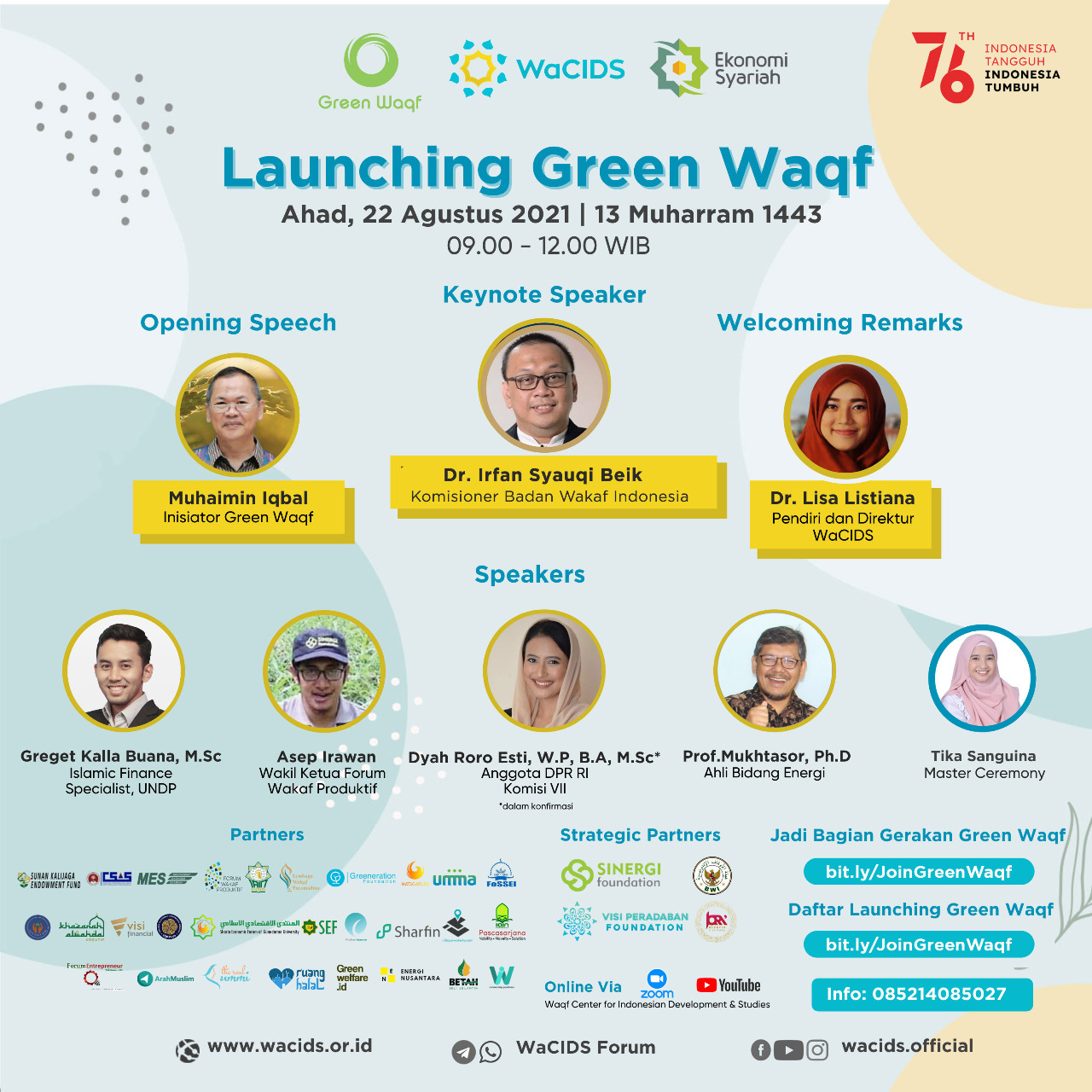Green Waqf: Waqf as a Solution to Environmental Recovery and Energy Independence
Oleh wacids, Dibuat tanggal 2021-08-26

Jakarta, Indonesia, August 22, 2021 – The Green Waqf Project initiated by Mr Muhaimin Iqbal is strategic, locally, nationally, and globally. Besides facilitating the collaboration of activists in the field of waqf, environmental, and renewable energy, this Green Waqf Project is very much in line with most Sustainable Development Goals (SDGs). The orientation of the Green Waqf is to answer today’s global issues, including climate change and energy security, said Dr Lisa Listiana as Project Coordinator of the Green Waqf.
This project was launched directly by the Commissioner of Badan Wakaf Indonesia (BWI), Dr Irfan Syauqi Beik, along with the initiator Mr Muhaimin Iqbal and the coordinator Dr Lisa Listiana. The event was broadcasted virtually through Zoom, YouTube, and Umma Indonesia. This launching was inspired by the 76th Independence Day of the Republic of Indonesia and the spirit of the Islamic New Year to benefit the people, improve the environment, and achieve social energy independence through renewable energy. The launching event organized by the Waqf Center for Indonesian Development and Studies (WaCIDS) and the Indonesian Waqf Fund Foundation (YDWI) was attended by various invited institutions, organizations, and communities, such as Bank Indonesia, KNEKS, IAEI, MES, Mata Garuda, Greeneration, Green Welfare, ThRU, etc. This project collaborates with several strategic partners such as the Visi Peradaban Foundation, IQRA’ Alfatih Institute, Sinergi Foundation, and BWI. Especially for the launching event, 27 organizations and communities joined as partners to assist the event publication.
“The commercial planting of 14 million critical lands is not very attractive, so using waqf can be effective because it does not use commercial calculations. Various hadiths became the underlying basis for continuing this planting project with the waqf scheme. This project uses the Nyamplung/Tamanu plant for the vision of renewable energy from Wali’s history. The focus is how to plant 14 million hectares and save the earth with the help of technology. Planting on the basis of seeking God’s pleasure and reward will not be cut off until the end of time,” said Mr Muhaimin Iqbal as the initiator of Green Waqf.
Member of the Commissioner of BWI, Dr Irfan Syauqi Beik, in the opening of the virtual launching of Green Waqf, said that BWI strongly encourages the emergence of innovations in the field of waqf that can optimize waqf and national sustainable development. Innovations related to Green Waqf can promote the SDGs principles and preserve natural wealth and sustainability. BWI will support so that this program can be implemented in Indonesia on a massive scale.
Dyah Roro Esti, WP, BA, M.Sc, as a Member of DPR RI Commission VII, said that one of the legal protections for energy in Indonesia is Law 16 of 2016. According to The Paris Agreement, The Nationally Determined Contribution (NDC) sets a target for reducing greenhouse gas emissions in Indonesia, which is 29% unconditional (with own efforts) and 41% conditional (with sufficient international support) by 2030. Emission reductions of 29% consist of 17% of the forestry sector, 11% of the energy sector, and 1% of other sectors. The linkage of renewable energy and the existence of a Green Waqf can reduce inequality and empower local resources for major investments, including renewable energy and low-carbon development.
In Islam, SDG 7 about the development of renewable energy and SDG 13 about environmental conservation are God’s mandate to humans as caliphs on earth(khalifatullah fil ardh),according to QS. Al-Baqarah verse 30. Thus, the development of renewable energy and environmental preservation are suitable as objects of waqf funding.
“Until now, there are still many people in Indonesia who do not get enough energy. With the existence of waqf, domestic capacity will increase through increasing clean energy. Producers of hydropower and solar panels are turned on, and domestic investment is improved, one of which is waqf financing. The hope is that waqf can play a big role in this goal.” said Prof. Mukhtasor, PhD, as an expert in the field of energy.
Asep Irawan, as a Deputy Chair of the Productive Waqf Forum (FWP), discussed the program and potential of productive waqf in the strategic sector to collaborate with the Green Waqf Project. He discussed some of the impacts of environmental damage in Indonesia and continued to provide the function of humans as representatives (Khalifah) on the earth. One of them is protecting the natural environment and human life. Concerning the Green Waqf project, he conveyed the Prophet’s encouragement to plant trees that would become alms and some waqf practices for nature conservation and energy security that have been carried out in Islamic traditions for centuries waqf in the form of forest and garden.
“The Islamic hybrid financing model in the form of waqf can be used to increase climate resilience inclusively and sustainably—climate resilience targeted by farmers. Waqf provides funding access for farmers. Farmers are also directed to carry out environmentally-friendly agricultural practices so that there is a climate change adaptation process,” said Greget Kalla Buana, M.Sc., an Islamic Finance Specialist from UNDP Indonesia.
Therefore, the Green Waqf project is a shared agenda. It requires enthusiasm and support from various parties and the public at large. It needs mutual support to attain energy independence and environmentally friendly behaviour which does not cause damage to our earth. In addition, an effective synergy can be established from the existence of a coordination forum that actively provides solutions and policy suggestions for the country of Indonesia.
By: Salwa Athaya Syamila, Lu’liyatul Mutmainah, and Uning Musthofiyah
Editor: Dr. Lisa Listiana
Categories: Berita
Tags: EBTgreenwaqfindonesianwaqfcenterrenewable energySDGsWaCIDSwaqfwaqfcenter